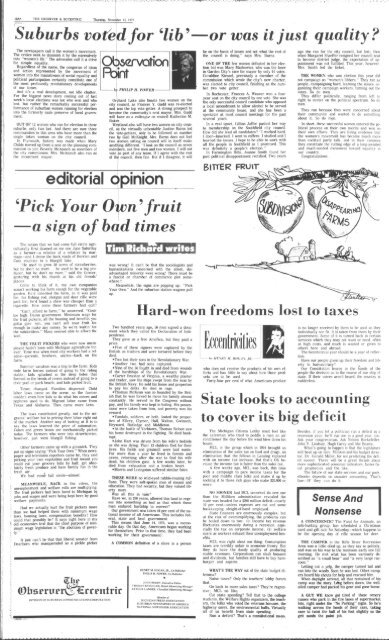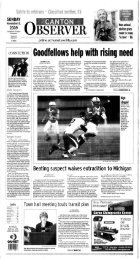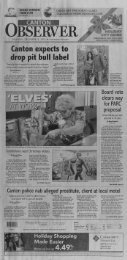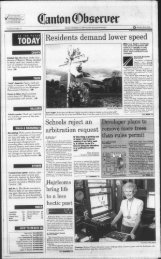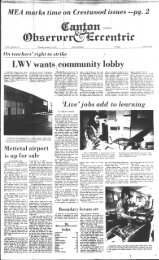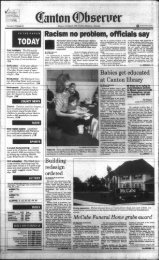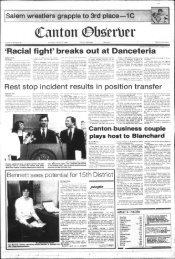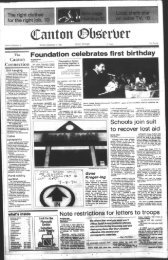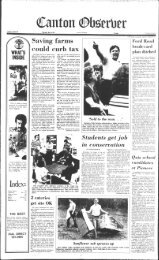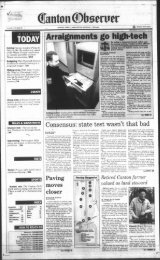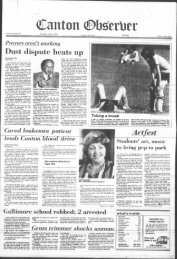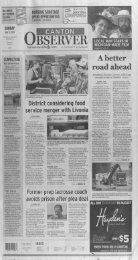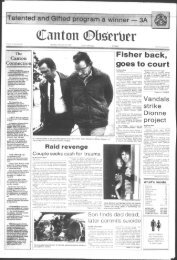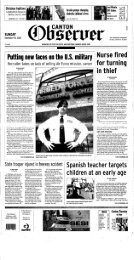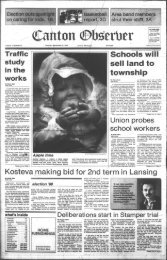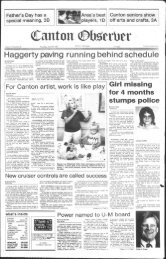Canton Observer for November 13, 1975 - Canton Public Library
Canton Observer for November 13, 1975 - Canton Public Library
Canton Observer for November 13, 1975 - Canton Public Library
You also want an ePaper? Increase the reach of your titles
YUMPU automatically turns print PDFs into web optimized ePapers that Google loves.
V- »<br />
THE OBSERVER k ECCENTRIC Thur*J«y, <strong>November</strong> <strong>13</strong>, <strong>1975</strong><br />
Suburbs voted <strong>for</strong> 4 lib'—or was it just quality?<br />
The newspapers call it the women's movement.<br />
The critics seek to diminish it by the excessively<br />
cute "women's lib." The advocates call it a drive<br />
<strong>for</strong> simple equality.<br />
Regardless of the name, the congeries of ideas<br />
and action represented by the movement of<br />
women into the mainstream of social equality and<br />
political participation certainly constitute one of<br />
the most profoundly revolutionary developments<br />
of our times.<br />
And it's a real development, not idle chatter.<br />
For the biggest news story coming out of last<br />
week's local elections was not who won and who<br />
lost, but rather the remarkably successful per<strong>for</strong>mance<br />
of suburban women running <strong>for</strong> election<br />
into the <strong>for</strong>merly male preserve of local government.<br />
OUT OF 12 women who ran <strong>for</strong> election in these<br />
suburbs, only two lost. And there are now three<br />
communities in this area who have more than the<br />
single token woman on the city council.<br />
In Plymouth, history was made when Mary<br />
Childs moved up from a seat on the planning commission<br />
to join Beverly McAninch as members of<br />
the city commission. Mrs. McAninch also ran as<br />
the incumbent mayor.<br />
Observation<br />
Fbint<br />
PHILIP H. POWER<br />
Orphard Lake also boasts two women on the<br />
city Council, as Frances Y. Gadd was re-elected<br />
and was the top vote getter. A strong prospect to<br />
becoine the community's next mayor, Mrs. Gadd<br />
will have as a colleague on council Katherine M.<br />
Bake^.<br />
Westland also will have two women on city council.<br />
as the virtually unbeatable Justine Bams led<br />
the v^ote-getters, only to be followed as number<br />
two by Gail McKnight. Mrs. Barns does not feel<br />
two women sitting on council will in itself make<br />
anything different. "I look on the council as seven<br />
members, not five men and two women. I will not<br />
vote ps part of any team. If I agree with the rest<br />
of the council, then fine. But if I disagree, it will<br />
< sditc >rial 0 pink :>n<br />
o\<br />
'Picl c Yo ur vn'j fruit<br />
a sign of bad times<br />
The notion that we had come full circle agriculturally<br />
first dawned on me one June Saturday<br />
as a farmer—a relative of a relative by marriage—and<br />
I drove the back roads of Berrien and<br />
Cass counties to a bluegill lake.<br />
"He used to grow 50 acres of strawberries,<br />
but he don't no more ... he used to be a big producer.<br />
but he don't no more," said the farmer,<br />
gesturing with his thumb at his old friends'<br />
places.<br />
Come to think of it, my own companion<br />
wasn't working his farm except <strong>for</strong> the vegetable<br />
garden He'd inherited the farm, so it was paid<br />
<strong>for</strong>; his fishing rod. shotgun and deer rifle were<br />
paid <strong>for</strong>; he'd found a chew was cheaper than a<br />
cigarette. How come these farmers had quit''<br />
"Can't af<strong>for</strong>d to farm," he answered. "Costs<br />
too high Damn government. Minimum wage <strong>for</strong><br />
the fruit pickers, all the housing and benefits you<br />
gotta give 'em, you can't sell your fruit <strong>for</strong><br />
enough to make any money. So we're waitin' <strong>for</strong><br />
the subdividers." Many seemed able to af<strong>for</strong>d the<br />
wait.<br />
THE FRUIT PICKERS who were now unem<br />
ployed hadn't been with Michigan agriculture <strong>for</strong><br />
ever. Time was when most city workers had a rel<br />
ative—parents, brothers, uncles—back on the<br />
farm.<br />
Summer vacation was a trip to the farm. Kids<br />
rode farm horses instead of going to the riding<br />
stable; kids splashed in the deep holes that<br />
<strong>for</strong>med in the bends of rivers instead of going to a<br />
civic pool or park beach; and kids picked fruit.<br />
Times changed. Families dispersed. Child<br />
labor laws came on the scene, so the farmer<br />
couldn't even hire kids to do what his nieces and<br />
nephews used to do. Migrant labor came from<br />
Texas and Alabama Then came more laws.<br />
The laws contributed greatly, not to the migrants'<br />
welfare but to pricing their labor right out<br />
of the market. Another way of looking at it is to<br />
say the laws lowered the price of automation.<br />
Cukes and green beans are mechanically picked<br />
today. The farmers who were into strawberries,<br />
however, just went bluegill fishing.<br />
Other farmers came up with a gimmick. They<br />
put up signs saying "Pick Your Own." When newspaper<br />
and television reporters came by, they said<br />
picking your own vegetables and fruit meant you<br />
could cut your grocery bills by half, get abso-<br />
, lutely fresh produce and have family fun in the<br />
fresh air. ,<br />
We had come full circle—almost.<br />
MEANWHILE, BACK in the cities, the<br />
'• unemployment and welfare rolls are multiplying.<br />
: The fruit pickers had been lured to Michigan by<br />
' jobs and wages and were being kept here by good<br />
• welfare payments.<br />
Had we actually hurt the fruit pickers more<br />
•: than we had helped them with minimum wage<br />
laws, housing laws, compensation benefits? How<br />
could that possibly be? It says right here in my<br />
?• old economics text that the chief purpose of minimum<br />
wage legislation is 'the abolition of poverty"<br />
It just can't be that that liberal senator from<br />
Dearborn who masqueraded as a pickle picker<br />
©bsrrurrCHErrnttnr<br />
DIVISION OF SUBURBAN COMMUNICATIONS CORPORATION<br />
Tim Richard writes<br />
was wrong! It can't be that the sociologists and<br />
humanitarians concerned with the silent, disadvantaged<br />
minority were wrong! There must be<br />
a fascist or chamber of commerce plot somewhere!!<br />
Meanwhile, the signs are popping up: "Pick<br />
Your Own." And the suburban station wagons pull<br />
up.<br />
be on the basis of issues and not what the rest of<br />
the council is doing," says Mrs. Barns.<br />
ONE OF THE few women defeated in her election<br />
bid was Mary Markowicz, who was the loser<br />
in Garden City's race <strong>for</strong> mayor by only 91 votes.<br />
Geraldine Kiessel, previously a member of the<br />
commission which wrote the city's new charter,<br />
was elected to city council, finishing as the number<br />
two vote getter.<br />
In Rochester, Frances A. Weaver won a fouryear<br />
seat on the city council by one vote. She was<br />
the only successful council candidate who opposed<br />
a local amendment to allow alcohol to be served<br />
at the community house, and she has been a<br />
spectator at most council meetings <strong>for</strong> the past<br />
several years.<br />
In a real upset, Lillian Jaffee pushed her way<br />
to membership on the Southfield city council.<br />
How did she lead all candidates? "I worked hard.<br />
I door—knocked. I went to coffees. I studied and I<br />
learned the issues. I hope to be able to work with<br />
all the people in Southfield as I promised. This<br />
was definitely a people's election."<br />
In Farmington Hills, Joanne Smith found her<br />
past political disappointment rectified. Two years<br />
BITTER FRUtr<br />
m<br />
ago she ran <strong>for</strong> the city council, but lost; then<br />
when Margaret Shaeffer resigned her council seat<br />
to become district judge, the expectation of appointment<br />
was not fulfilled. This year, however.<br />
Mrs. Smith led the ticket.<br />
THE WOMEN who won election this year did<br />
not campaign as "women's libbers." They ran as<br />
people, campaigning hard, learning the issues, organizing<br />
their campaign workers, turning out the<br />
votes. So do men.<br />
They differ politically, ranging from left to<br />
right to center on the political spectrum So do<br />
men.<br />
They ran because they were concerned about<br />
their community and wanted to do something<br />
about it. So do men.<br />
In short, these successful women entered the political<br />
process on their own merits and won on<br />
their own ef<strong>for</strong>ts. They are living evidence that<br />
the women's movement has become much more<br />
than cocktail party talk, and in their victories<br />
they constitute the cutting edge of a long-awaited<br />
and much-needed movement toward equality in<br />
our country.<br />
Congratulations.<br />
%<br />
•Mp<br />
ft*<br />
Hard-won freedoms lost to taxes<br />
Two hundred years ago, 56 men signed a document<br />
which they called the Declaration of Inde<br />
pendence<br />
They gave us a free America, but they paid a<br />
price.<br />
•Five of these signers were captured by the<br />
British as traitors and were tortured be<strong>for</strong>e they<br />
died.<br />
•Two lost their sons in the Revolutionary War.<br />
•Another two had sons captured.<br />
Nine of the 56 fought in and died from wounds<br />
of the hardships of the Revolutionary War.<br />
•Carter Braxton of Virginia, a wealthy planter<br />
and trader, saw his ships swept from the seas by<br />
the British Navy. He sold his home and properties<br />
to pay his debts. He died in rags.<br />
•Thomas McKean was so hounded by the British<br />
that he was <strong>for</strong>ced to move his family almost<br />
constantly. He served in the Congress without<br />
pay, and his family was kept in hiding. His possessions<br />
were taken from hirn, and poverty was his<br />
reward.<br />
• Vandals, soldiers, or both, looted the properties<br />
of Ellery, Clymer, Hall, Walton. Gwinnett,<br />
Heyward, Rutledge and Middleton.<br />
• At the battle of Yorktown, Thomas Nelson saw<br />
his home destroyed in the fighting. He died bankrupt.<br />
•John Hart was driven from his wife's bedside<br />
as she was dying. Their <strong>13</strong> children fled <strong>for</strong> their<br />
lives. His fields and gristmill were laid waste<br />
For more than a year he lived in <strong>for</strong>ests and<br />
caves, returning after the war to find his wife<br />
dead, his children gone. A few weeks later, he<br />
died from exhaustion and a broken heart.<br />
•Morris and Livingston suffered similar fates.<br />
THESE WERE no wild-eyed rabble-rousing ruffians.<br />
They were soft-spoken men of means and<br />
education. They had security, but they valued liberty<br />
more.<br />
Was all this in vain?<br />
Have we, in 200 years, allowed this land to regress<br />
into something as bad as that which these<br />
men endured hardship to correct?<br />
Our government now takes 44 per cent of the national<br />
income of all Americans. This includes federal,<br />
state and local government.<br />
This means that June 14, <strong>1975</strong>, was a memorable<br />
day. On that day, Americans began working<br />
<strong>for</strong> themselves. Prior to that time, they had been<br />
working <strong>for</strong> their government!<br />
A COMMON definition of a slave is a person<br />
HENRY M. HOGAN. JR., Co-Publisher<br />
PHILIP H POWER. Co-Publuher<br />
JOHN REDDY. Extcutwt Editor<br />
THOMAS REYNOLDS. Retail Adtertuing Manager<br />
AR I HI R LANGER, Classified Advertising Manager<br />
MM<br />
Member of<br />
MICHIGAN PRESS ASSOCIATION<br />
SUBURBAN NEWSPAPERS OF AMERICA<br />
NATIONAL NEWSPAPER ASSOCIATION<br />
by HE\H\ M. HOC IV, JR.<br />
who does not receive the products of his own ef<strong>for</strong>ts<br />
and has little to say about how those products<br />
are to be used.<br />
Forty-four per cent of what Americans produce<br />
is no longer received by them to be used as they<br />
individually see fit. It is taken from them by their<br />
government. Some of it is turned back in certain<br />
services which they may not want or need, often<br />
at high costs, and much is wasted or given to<br />
others here and abroad<br />
The bicentennial year should be a year of reflection.<br />
Have our people given up their freedom and liberty<br />
to bureaucracy 9 v<br />
Our Constitution leaves in the hands of the<br />
people the decision as to the course of our ship of<br />
state. If their voices aren't heard, the country is<br />
rudderless.<br />
State looks to accounting<br />
to cover its big deficit<br />
The Michigan Citizens Lobby must feel like<br />
the salesman who tried to peddle a man an air<br />
conditioner the day be<strong>for</strong>e the wind blew down his<br />
house.<br />
MCL is the group which in 1974 brought us<br />
elimination of the sales tax on food and drugs, an<br />
elimination that the fellows in Lansing replaced<br />
with an income tax increase. But that's OK because<br />
the income tax is fairer than the sales tax.<br />
A few weeks ago, MCL was back, this time<br />
with a campaign to pare income taxes <strong>for</strong> the<br />
poor and middle class folks and make it up by<br />
socking it to those rich guys who make $20,000 or<br />
more.<br />
NO SOONER had MCL uncorked its new one<br />
than the Milliken administration revealed the<br />
state was headed <strong>for</strong> a $298 million deficit—nearly<br />
10 per cent—unless expenses are cut and some<br />
bookkeeping sleight-of-hand employed.<br />
State finances are enormously complex, but<br />
at the risk of oversimplifying, the problems can<br />
be boiled down to two: (1) Income tax revenue<br />
fluctuates enormously during a recession, especially<br />
the tax on corporate income; (2) welfare<br />
soars as workers exhaust their unemployment benefits.<br />
MCL was right about one thing: Consumption<br />
taxes are terribly unfair in economic theory. But<br />
they do have the dandy quality of producing<br />
stable revenues. Corporations can slash bonuses<br />
and dividends, but families still have to buy hamburger<br />
and aspirin.<br />
WHAT'S THE WAY out of the state budget dilemma?<br />
Raise taxes? Only the teachers' lobby favors<br />
that.<br />
Go back to more sales taxes? They're regressive;<br />
MCL no like.<br />
Cut state spending? Tell that to the college<br />
students, the Welfare Rights organizers, the teachers,<br />
the folks who voted the veterans bonuses, the<br />
highway users, the environmental buffs. Virtually<br />
all of us benefit from state spending.<br />
Run a deficit? That's a constitutional no-no.<br />
Besides, if you let a politician run a deficit in a<br />
recession year, he'll run one in a good year. too.<br />
Ask your congressman. Ask Nelson Rockefeller.<br />
John V. Lindsay. Hugh Carey and Abe Beame.<br />
What's going to happen is that the legislature<br />
will beat up on Gov. Milliken and his budget director.<br />
Dr. Gerald Miller, <strong>for</strong> not predicting the deficit<br />
sooner. There will be a great thrash about<br />
more sophisticated economic indicators, faster fiscal<br />
prophecies and the like.<br />
The future of our state services and our pocketbooks<br />
depends on snazzier accounting. That's<br />
fine—IF they can do it.<br />
Sense And<br />
Nonsense<br />
A COINCIDENCE? The Fund <strong>for</strong> Animals, an<br />
anti-hunting group, has scheduled a Christmas<br />
card and gift sale <strong>for</strong> Saturday—which happens to<br />
be the opening day of rifle season <strong>for</strong> deer.<br />
THE CAMPER in the Rifle River Recreation<br />
Area was a little oiled up. as they say so politely,<br />
and was on his way to the restroom early one fall<br />
morning. He met what has been variously described<br />
as "a small bear" and "a very large raccoon."<br />
Letting out a yelp, the camper turned tail and<br />
ran into the woods. Soon he was lost. Other campers<br />
heard his shouts <strong>for</strong> help and rescued him.<br />
When daylight arrived, all that remained of his<br />
camp was the story. Ltfng be<strong>for</strong>e dawn, the welloiled<br />
camper had packed his geer and gone home.<br />
A GUY WE know got tired of these ornery<br />
cusses who park in the fire lanes of supermarket<br />
lots, right under the "No Parking" signs. So he's<br />
walking across the hoods of their cars, taking<br />
care to twist the ball of his foot slightly so the<br />
grit sands the paint job.


